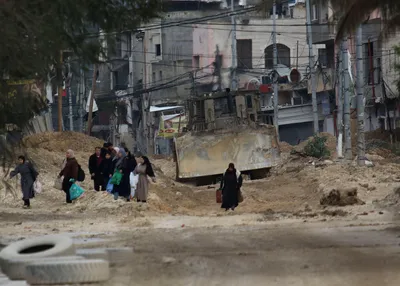MPs visit communities at the sharp end of occupation with MAP and Caabu
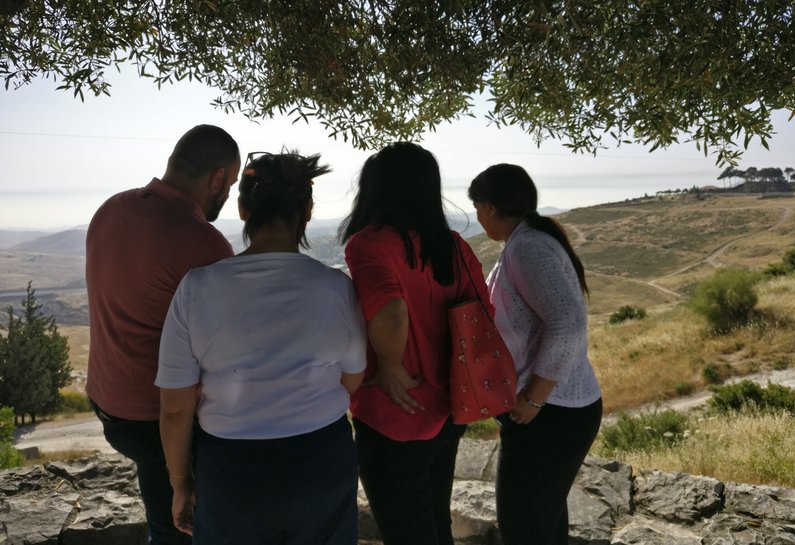
This delegation comprised Rushanara Ali (Bethnal Green & Bow), Yasmin Qureshi (Bolton South East), and Naz Shah (Bradford West).
Day 1: Briefing at the British Consulate in East Jerusalem
On 27 May, the MPs were briefed by Consul General Philip Hall about the current political climate in the oPt, particularly in the context of US President Trump’s long-awaited, so-called “Deal of the Century” and shifts in US policy.
Day 2: East Jerusalem, child detainees, Jordan Valley
The day started with a tour of occupied East Jerusalem with Jerusalem Legal Aid Centre (JLAC). We heard how Israel’s separation wall has rent apart Palestinian families and communities, with access to the city for Palestinians elsewhere in the oPt controlled by Israel’s permit system. We learned of the precarious existence facing Palestinian residents of East Jerusalem created by the ever-looming threat of house demolitions and the revocation of residency status. Approximately 28% of Palestinian housing in East Jerusalem (containing some 80,000 people) is considered “illegal” by the (Israeli) Jerusalem Municipality, and only 13% of the land is zoned for Palestinian construction, much of which is already full. In May the UN recorded the highest rate of demolitions in a decade, with more homes demolished in East Jerusalem in the first four months of 2019 than the whole of last year.
Then at the YMCA in Ramallah, we met five young Palestinians who had been arrested and detained as children by the Israeli military. They described how night-time raids of their homes, coercive interrogations (several of them reporting having been pressured to sign Hebrew documents they did not understand), and the indignity and uncertainty of the military courts had affected their mental wellbeing and that of their families.
A tour of northern Jordan Valley with Palestinian human rights organisation Al Haq followed. In Al Awja village we met a farmer who described how restrictions to his access to fresh (non-salinated) water meant he had been forced to stop cultivating citrus fruit and bananas, and was now only able to grow dates. From a workforce of 40, he now has just nine people working on the farm. With less agricultural work in the area, he told us many young people were now only able to find work on Israeli settlement farms and factories. There, they work with few labour rights and are dependent on work permits issued by – and easily revoked by – the Israeli authorities.
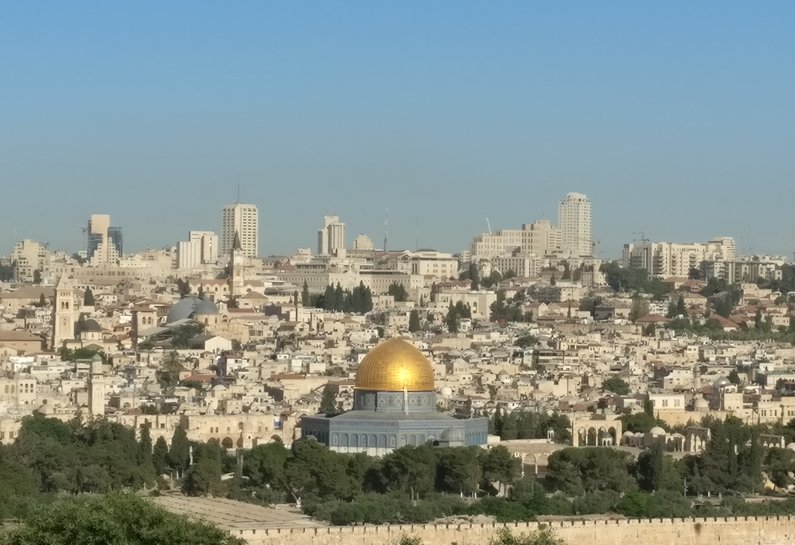
We visited a home in Area C – the 60% of the occupied West Bank that remains under full Israeli military and civil control – that was recently demolished, and the community of Khirbet Al Makhoul which was completely demolished by Israel in 2013. From 20 families living on the site, now only five remain. “No matter how many times they demolish, I am not leaving” one resident told us.
Day 3: Military courts, Dheisheh refugee camp, Hebron
At the military courts at Ofer prison we spoke with the families of detained Palestinians and watched shackled Palestinian youth undergo their trials. The stark statistics provided by Military Court Watch speak for themselves: These courts have a conviction rate of 99%, children as young as 12 can be brought before them, and approximately 800-1,000 children are detained by Israel every year.
Later, at Dheisheh refugee camp near Bethlehem, representatives of UNRWA told us of the challenges to their essential services posed by the organisation’s chronic funding crisis which deepened with the US’s decision to withdraw all of its funding last year. The camp is raided by Israeli security forces approximately once a week, and in March was the site of the killing of Palestinian volunteer paramedic Sajed Muzher. 17-year-old Sajed was the fourth paramedic to be killed by Israeli forces in a year.
We continued southwards for a tour of Hebron with Breaking the Silence, where MPs witnessed the impact on the city’s Palestinian population of intensive movement restrictions and heavy military presence resulting from the illegal presence of 800 Israeli settlers. Hebron’s former commercial heart, Shuhada Street, is now a ghost town, with Palestinians prohibited from access and hundreds of shops now closed down.
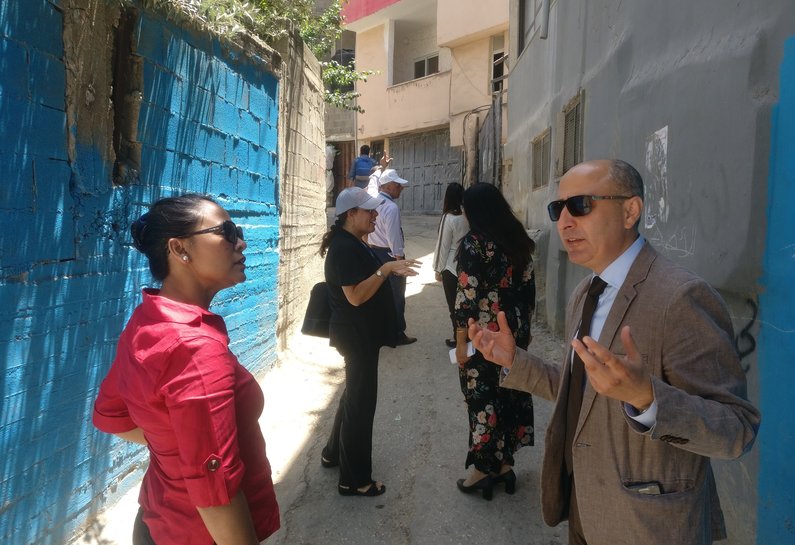
In the evening, facilitated by the Women's Centre for Legal Aid and Counselling (WCLAC) and Oxfam, we were graciously hosted by a family living in the Hebron neighbourhood of Tel Rumeida, accessible to its residents only through a checkpoint. A group of women and girls told us about the harassment they endure from settlers, and the dire constraints on their daily lives, whether work, shopping, accessing healthcare or going to school.
Day 4: East Jerusalem hospital, MAP’s mobile health clinic and PRCS ambulance station
Our final day began with a visit to the Augusta Victoria Hospital (AVH) in East Jerusalem. As the only Palestinian hospital able to provide a number of essential healthcare services including radiotherapy and many other cancer treatments, access to it is vital for Palestinians across the oPt. As another MP who recently visited AVH, Dr Rosena Allin-Khan, recently reported, Israel continues to grant permits for patients and their companions – particularly those from Gaza – at an alarmingly low rate. Delays and denials to exit permits cause life-threatening interruptions to care, and can separate children from their children at a critical and stressful time in their lives.
As MPs are not permitted to access Gaza via Israel, this visit afforded the MPs an opportunity to talk directly to Palestinians from Gaza, where the health system has been decimated by 12 years of illegal closure. Among those we met were a two-year old boy with a tumour in his kidney requiring surgery, chemotherapy and radiotherapy. His other kidney does not function due to a congenital defect, meaning that he needs regular dialysis. In February, he exited Gaza and received chemotherapy at the Sheba Medical Centre in Israel to shrink the tumour, and he then was referred on to AVH where the tumour was removed, as well as radiotherapy and dialysis.
Due to the severity of his case, he will be there another four to six months. He was at the hospital with his grandmother, who told us the boy’s mother and father were unable to obtain permits to accompany him. This is not uncommon: in April, 48% of permit applications for patient companions from Gaza were wither denied or delayed by the Israeli authorities.
Our healthcare-focused day continued with a visit to the Bedouin refugee community of Abu Nuwwar with the MAP-supported mobile clinic, run in partnership with the Islah Charitable Society (ICS). The community sits in Area C, in the shadow of the sprawling settlement of Maale Adumim. The ICS team were running a health education session for women of the community. The MPs heard from members of the community about life under the constant threat of forcible transfer. We also peeked inside the new mobile clinic van, recently funded and launched with the help of MAP supporters, and learnt from the ICS team about their vital provision of primary healthcare given that the Israeli authorities do not allow any permanent health infrastructure in Area C.
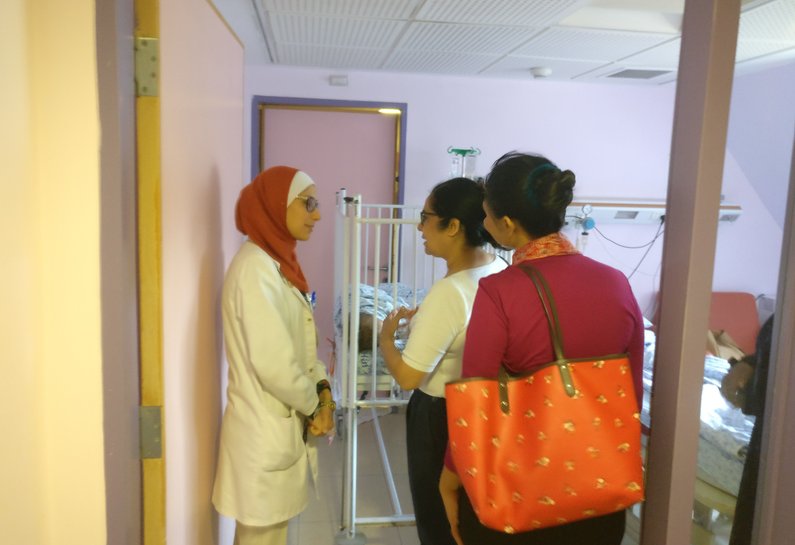
Back in East Jerusalem, we visited the Palestinian Red Crescent hospital and ambulance station. Paramedic Mohamed Fityani described the “back-to-back” transfer process most patients from Gaza and the rest of the West Bank endure when entering East Jerusalem through a checkpoint – being transferred out of a Palestinian-registered ambulance to an Israeli-registered one, even if in a critical condition. This process can cause dangerous delays, exposes patients to unnecessary environmental hazards, and is uncomfortable or painful for those with injuries. Mohamed told us about the obstruction, threats and violence Palestinian paramedics often face from Israeli security forces when carrying out their vital – and protected under international law – humanitarian work.
MAP extends our deepest thanks to all who took the time to meet us, to talk about their lives, and help us all to better understand the impact of the occupation on the health, dignity and wellbeing of the people who endure it.
Related content


